AlanTuring
Latest

Listen to a 1950s era computer sing 'Jingle Bells'
Here's a new version of Jingle Bells you won't hear played in malls, and it's courtesy of one of the oldest computers in history. Turing archive director Jack Copeland and composer Jason Long have recreated Ferranti Mark 1's Christmas performance for the BBC back in 1951. During that broadcast, the first commercially available general-purpose electronic computer (housed at Alan Turing's Computing Machine Laboratory) performed several melodies created using the sounds it used to emit.
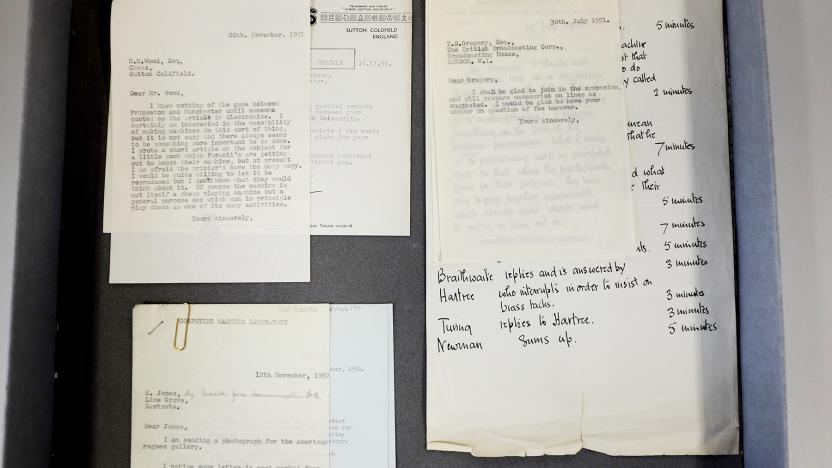
Lost Alan Turing letters found in university filing cabinet
A huge batch of letters penned by British cryptographer Alan Turing has been found at the University of Manchester. Professor Jim Miles was tidying a storeroom when he discovered the correspondence in an old filing cabinet. At first he assumed the orange folder, which had Turing's name on the front, had been emptied and re-used by another member of staff. But a closer look revealed 148 documents, including a letter sent by GCHQ, a draft version of a BBC radio programme about artificial intelligence, and invitations to lecture at some top universities in America.
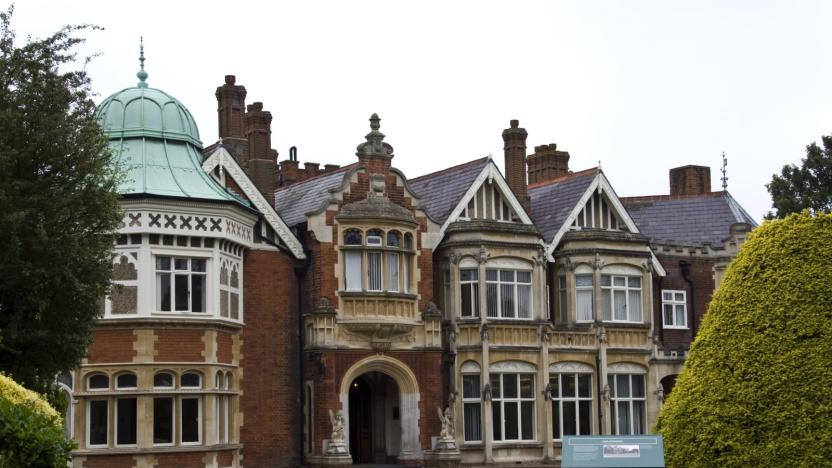
UK's Bletchley Park to host cybersecurity boarding school
Bletchley Park will once again serve as a cryptographic hub in the UK. Plans are afoot to create a new "National College of Cyber Security" in G-Block, a building which is currently in a state of disrepair. It's scheduled to open in 2018 and will serve as a specialised six-form college, teaching teenagers the fundamentals of encryption and computer science. As the Guardian reports, the center will take up to 500 students at any one time and offer free tuition, funding its efforts through venture capital, corporate sponsorship and possibly state funding instead. It's envisioned as a boarding school, however a day tuition option will also be available.
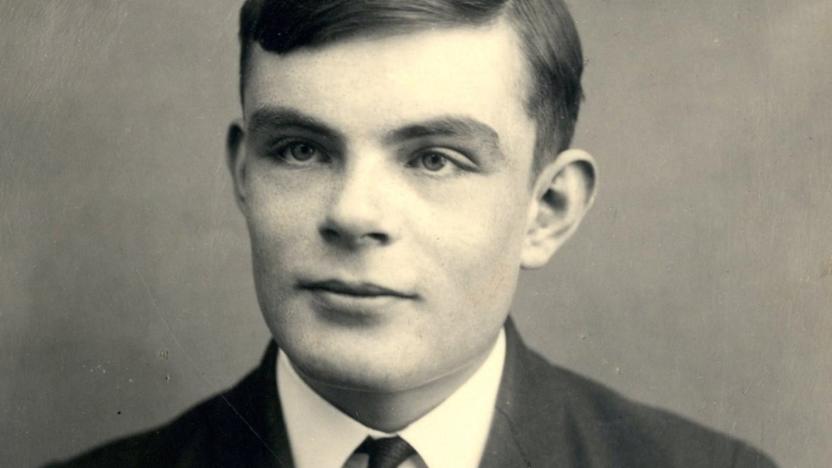
UK 'Turing Law' will posthumously pardon convicted gay men
Under new legislation, thousands of gay and bisexual men will receive posthumous pardons from the UK government. Dubbed the "Alan Turing Law," an amendment to the Policing and Crime Bill will rectify old convictions for consensual same-sex relationships, which were decriminalised in England and Wales in 1967. The policy builds on the case of Alan Turing, a brilliant cryptographer who helped Britain and the Allied Powers decode messages during World War II. Turing was prosecuted in 1952 for homosexual acts and died in 1954 from cyanide poisoning. In 2009, the British government officially apologised for his treatment, before a posthumous pardon was granted by Queen Elizabeth II in 2013.
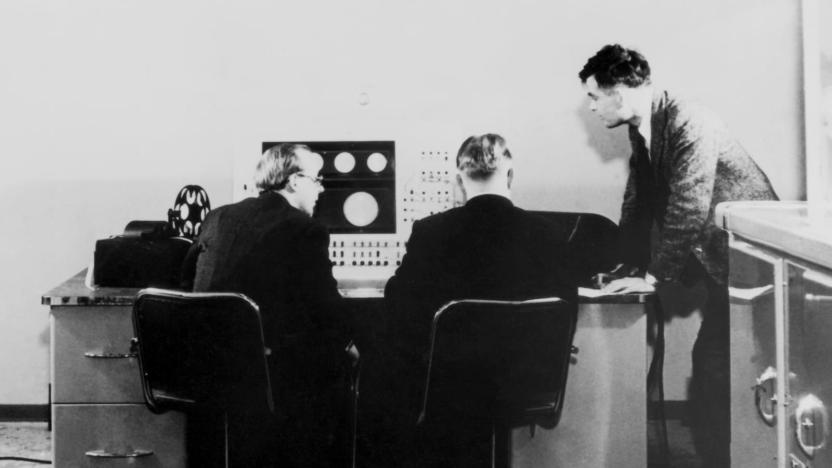
Alan Turing's groundbreaking synthesizer music restored
Alan Turing is known for a few small achievements, like helping end World War II, laying the groundwork for modern computers and developing the "Turing test" for machine intelligence. You may not be aware, however, that he paved the way for synthesizers and electronica by inventing the first computer-generated musical tones. A pair of researchers from the University of Cantebury have now restored the first-ever recording made from Turing's "synthesizer."
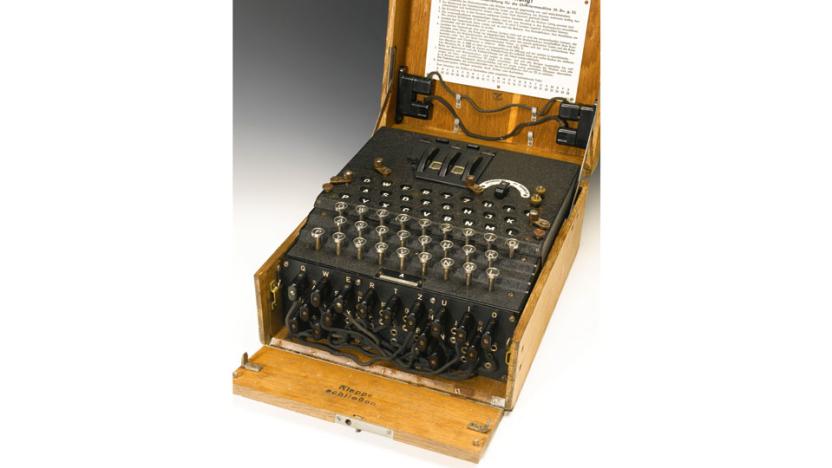
Rare Enigma machine sells for $233,000
An unnamed buyer has purchased an ultra-rare three-rotor German Enigma machine for the better part of $233,000. It was sold by an equally-secretive "European museum foundation" by the auctioneers Sotheby's in London for almost twice the expected price. During the Second World War, German troops were instructed to destroy their Enigma machines to prevent them falling into enemy hands, with only a handful surviving. While tainted as a piece of Nazi memorabilia, the item is also a valuable artifact in the history of modern computing. The Allied effort to break the code and Alan Turing's involvement would pave the way for the devices we use today and interest has been renewed since the release of The Imitation Game.

Engadget Daily: 'The Imitation Game,' Ricoh's upgraded 360-degree camera, and more!
Alan Turing has long been regarded as the father of modern computing. Why? We're glad you asked. Today, we dive into the history of the Turing machine, go hands-on with Ricoh's new Theta camera, and take a look at Corning's new Gorilla Glass 4. Read on for Engadget's news highlights from the last 24 hours.
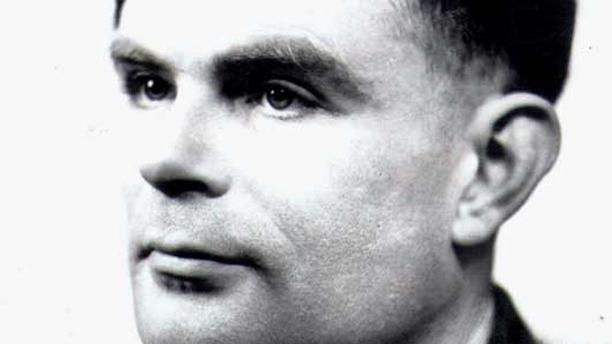
Supercomputer passes the Turing test by mimicking a teenager (update: reasons to be cautious)
After 64 long years, it looks like a machine has finally passed the Turing test for artificial intelligence. A supercomputer in a chat-based challenge fooled 33 percent of judges into thinking that it was Eugene Goostman, a fictional 13 year old boy; that's just above the commonly accepted Turing test's 30 percent threshold. Developers Vladimir Veselov and Eugene Demchenko say that the key ingredients were both a plausible personality (a teen who thinks he knows more than he does) and a dialog system adept at handling more than direct questions.

UK pardons computing pioneer Alan Turing
Campaigners have spent years demanding that the UK exonerate computing legend Alan Turing, and they're finally getting their wish. Queen Elizabeth II has just used her royal prerogative to pardon Turing, 61 years after an indecency conviction that many now see as unjust. The criminal charge shouldn't overshadow Turing's vital cryptoanalysis work during World War II, Justice Secretary Chris Grayling said when explaining the move. The pardon is a purely symbolic gesture, but an important one all the same -- it acknowledges that the conviction cut short the career of a man who defended his country, broke ground in artificial intelligence and formalized computing concepts like algorithms.

UK government receptive to bill that would pardon Alan Turing
Many in the UK recognize Alan Turing's contributions to computing as we know it, but attempts to obtain a pardon for the conviction that tragically cut short his career have thus far been unsuccessful. There's a new glimmer of hope, however: government whip Lord Ahmad of Wimbledon says that the current leadership has "great sympathy" for a bill that would pardon Turing. As long as no one calls for amendments, the legislation should clear Parliament's House of Lords by late October and reach the House of Commons soon afterward. While there's no guarantee that the measure will ultimately pass, the rare level of endorsement suggests that Turing's name could soon be cleared.

Google's Turing doodle celebrates his genius, reminds us how dumb we are (video)
This week sees many corners of the globe celebrating the 100th anniversary of the birth of Alan Turing. A man whose contribution to the worlds of tech and gadgets is immeasurable -- a sentiment not lost on Google. Today, geeks and norms worldwide will be waking up to possibly the most complex doodle to date. Can you set the machine and spell out "Google"? If you can, you'll be sent off to lots more information about the man himself. This isn't the only thing Mountain View's done to keep his legacy alive, having previously helped Bletchley Park raise funds to purchase (and display) Turing's papers, and more recently helping curators at London's Science Museum with its Codebreaker - Alan Turing's Life and Legacy exhibition. If you haven't already, head to Google.com and pop your logic hat on, and if you get stuck, head past the break for a helpful video.

Alan Turing's breakthrough machine gets a loving Lego tribute (video)
In the world of technology, having one of your inventions rendered in Lego form is the equivalent of a musician being parodied by Weird Al -- it's a sign you've truly made it and tribute to your influence. So, we're more than a little surprised to see that it's taken this long for the Turing Machine to be lovingly built from plastic bricks. The heart of this simple logic device is a Lego Mindstorms NXT set, but the soul is in Alan Turing's genius -- a man who was before his time and unjustly persecuted for failing to properly fit into society's molds. Dutch researchers Jeroen van den Bosand and Davy Landman built the device as a tribute to Turing, who would have celebrated his 100th birthday this Saturday. If you're in Amsterdam you can see the machine yourself at Centrum Wiskunde & Informatica's Turings Erfenis exhibit. Or, you can watch the short explanatory video after the break.

Remembering Alan Turing at 100
Alan Turing would have turned 100 this week, an event that would have, no doubt, been greeted with all manner of pomp -- the centennial of a man whose mid-century concepts would set the stage for modern computing. Turing, of course, never made it that far, found dead at age 41 from cyanide poisoning, possibly self-inflicted. His story is that of a brilliant mind cut down in its prime for sad and ultimately baffling reasons, a man who accomplished so much in a short time and almost certainly would have had far more to give, if not for a society that couldn't accept him for who he was. The London-born computing pioneer's name is probably most immediately recognized in the form of the Turing Machine, the "automatic machine" he discussed in a 1936 paper and formally extrapolated over the years. The concept would help lay the foundation for future computer science, arguing that a simple machine, given enough tape (or, perhaps more appropriately in the modern sense, storage) could be used to solve complex equations. All that was needed as Turing laid it out, was a writing method, a way of manipulating what's written and a really long ream to write on. In order to increase the complexity, only the storage, not the machine, needs upgrading.

Google donates $850,000 to restore home of the codebreakers
Google has donated £550,000 ($850,000) towards the £15 million project to renovate Bletchley Park. The donation from Mountain View is part of a $100 million charitable program that's previously helped rescue Alan Turing's personal papers. The country estate is the former home of Station X and the British Government's Code and Cypher School, which was where the World War Two model of the Enigma Machine was decrypted. Turing, its most famous alumnus went on to pioneer computer science and artificial intelligence during his short life and the complex now houses the National Museum of Computing. Unfortunately the buildings are rapidly collapsing and enormous investment is still required to transform the site into a museum, attraction and fitting tribute to the work of the codebreakers.

Turing machine built from wood, scrap metal and magnets, 'geek' achievement unlocked (video)
We take it for granted nowadays that thumbnail-sized silicon chips can crunch through the most complex of calculations, but early last century, mathematical tasks were still being carried out by humans. It was around that time that one Alan Turing, Enigma code breaker and general computer science pioneer, came up with what was essentially a thought experiment, a mechanical machine capable of simulating and solving algorithms just like a grown-up CPU. Well, you know where this is going by now, one British software engineer decided to build just such a device, out of old bits and bobs he had lying around his geek lair, producing a working model that was recently shown off at the Maker Faire UK in Newcastle. The only downer, as he points out, is that it'd take "months to add two numbers together," but all good things start off humbly. Video after the break.

Britons build working replica of the Turing Bombe
Just in case Al Qaeda or other "evildoers" du jour decide to start communicating in code via the WWII-era Enigma code -- we'll have the Turing Bombe on our side. This working replica of the machine used by British cryptologists at Bletchley Park, the epicenter of the counter-Enigma effort was unveiled at that site earlier this week. According to an article by The Register: "The Bombes used 108 electromagnetic spinning drums to test combinations of letters and reveal the likely keys to the Enigma code used in a particular message." The article goes on to say that Churchill ordered the 200 Bombes that had been built dismantled by the end of the war, and that it wasn't until the 1970s that the classified nature of these devices was lifted. Unlike the shrouded secrecy that its original was wrapped in, this replica will be open to the public -- from September 23-24, there will be a reunion of Bletchley Park veterans and a special demonstrations with war re-enactors in period dress. No word on who will play Alan Turing, though, but our own England bureau chief, Conrad Quilty-Harper, is a likely candidate.[Via The Register]








